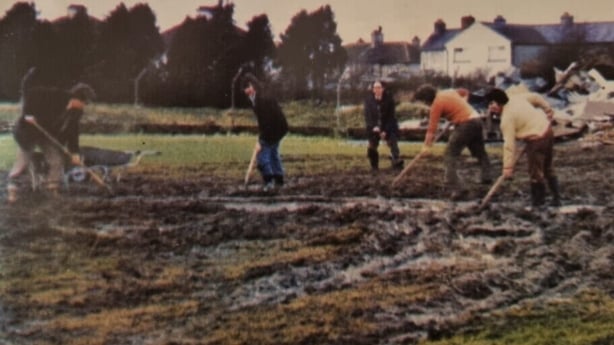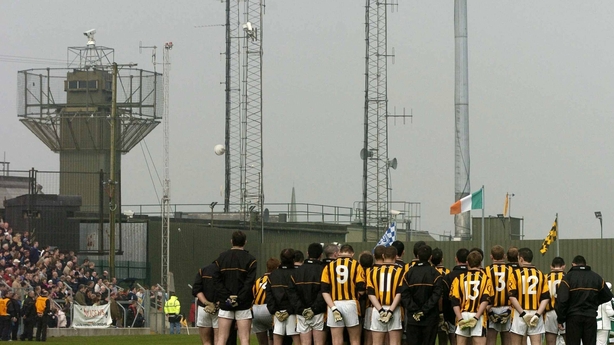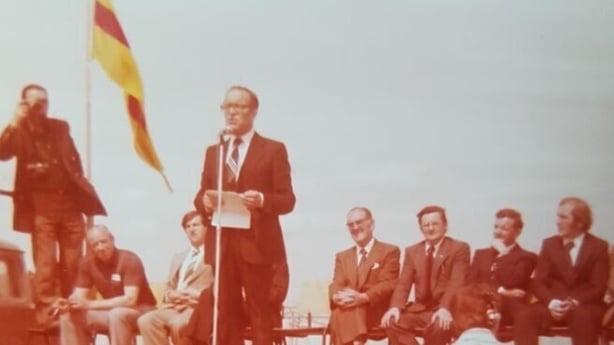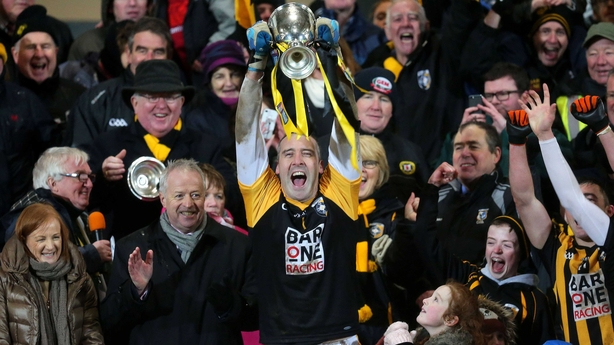Fifty years ago, the British Army first requisitioned part of St Oliver Plunkett Park in Armagh – home of Crossmaglen Rangers. At a meeting with club officials five years later, British personnel made it clear that their eventual plan was to take over the entire grounds to build amenities for their troops.
The information divulged at the house of Gene Duffy, Cross secretary in 1971 and a man who would go on to sit on high-level GAA committees at county, provincial and national level, would embolden club members to fight – peacefully – for what was considered the beating heart of the south Armagh town.
"There was a meeting held in our house and we met their civil representations and we asked them what their full intentions were," Duffy said of that meeting.
"They were out to the 50-yard line at the time and I threw one out to them, I asked them had they any plans to take the entire place over.
"We said if they were, could we be given a new location adjacent to the town and that could be a solution. That was thrown out as bait, there was never any intention of us moving but they laid out their plans on the table.
"They had plans to take over the entire pitch and there was to be a small soccer pitch in the middle of it, tennis courts too. They were showing us on the basis that they thought we were interested in moving, they wouldn't have shown us this otherwise.
"There were four of us at that meeting including the late Gene Larkin, chairman of the club, and immediately afterwards we rang Con Murphy, who was President of the GAA. Con drove to Dublin, arrived at Croke Park and had a meeting with Liam Mulvihill, the Director General of the GAA about writing a letter of protest.
"We went to the British Ambasador’s house that night in Ballsbridge and we had the RTÉ cameras with us. The ambassador’s secretary, or whoever it was, took the letter and it was on the nine o’clock news that night.
"There was uproar and the lads who came and told us their plans, I never heard tell of them again. They let the thing slip."
The message had been delivered to Croke Park, but it had to be relayed to the members too. A meeting was called where the phrase 'garrison town’ laid bare exactly what would lie in store should the protesting abate rather than intensify.

"At that time kids weren’t allowed onto the field because they were being harassed so we called a meeting of the town, a general meeting," Duffy continued.
"Basically we set out to them that if the army got a permanent hold of this, we were going to have a garrison town.
"We had a professor of Irish history down to explain what a garrison town was and what it did to towns way back in the day. It wasn’t pretty.
"We decided to bring the public in to a meeting at the old hall in Crossmaglen, you couldn’t get in the door. It was jam-packed.
RTÉ ARCHIVES - BRITISH ARMY LEAVES CROSSMAGLEN
"We had just been tiddling on. There would be incidents here and there but nothing really major.
"When we had the plans that they were attempting to take over the whole place, we decided to let the town know.
"It was a sort of reawakening of the juvenile section too because we got loads and loads of people. Kids would come home from school and head to the pitch prior to the army arriving, but that went.
"We managed to get that back because we guaranteed that we would never allow 20 youngsters on the field unless there were five adults with them.
"The adults wouldn’t be fully trained GAA coaches but they would have been guardians for them. A lot of them had no idea how to coach football but we actually got loads of coaches out of it and from the mid-80s the underage started coming strong again."
Crossmaglen will this afternoon go in search of their 22nd Armagh senior football title since 1996 when they take on Clann Eireann in the county final at the Athletic Grounds.
One of the club’s key weapons were contacts and their ability to bring their plight to high powered officials not only in Ireland but in England as well.
That started early and was particularly apparent in May 1972 as claims and denials were made over an alleged assault on a Silverbridge player who had been playing against Crossmaglen.
In a written statement, Patrick Tennyson said that just before throw-in, a helicopter landed on the pitch – a regular occurrence at the time - and army personnel tried to clear the players off the field.
Tennyson said that he was hit with the barrel of a gun and woke up in hospital in Newry, an account corroborated by team-mates, opponents and spectators.
The issue was brought to the GAA president at the time, Pat Fanning, who, in turn, sent a letter to then Taoiseach Jack Lynch. The Cork man raised the issue personally with the British Ambassador and when the Northern Ireland office was also informed, the reply stated that any injuries were caused by "a group of hooligans who started throwing stones from behind some caravans" with the missiles intended for soldiers striking players instead.
Rebuttals would be something the club would have to get used to right up until the very end. The confidence of those denials were reinforced by the image painted of the south Armagh area.
In 1974, then Northern Ireland Secretary Mervyn Rees described it as ‘Bandit Country’ (locals responded by referring to it as ‘God’s Country’) while in the same year in the House of Lords, Crossmaglen was described as "a horrid little place".
It was also in June 1974 that Rees, under the Northern Ireland Emergency Provisions Act of 1973, served a vesting order to the club explaining that they had the right to take a parcel of land to create a helicopter pad. Helicopters had already been landing on the grounds, tearing up the pitch in the process, but now a section of the property was essentially out of bounds for the club.
Although these words and acts were demoralising, Cross officials vowed not to be broken and a couple of shows of strength offered much-needed support.
One of those was an Ulster rally in the town where every club in the province sent representatives with flags and banners.
"Every club came with their banners from all nine counties, there were thousands there," Duffy continued.
"There was a massive parade from the church carpark out the Newry Road. The main platform was at the bottom end of the ground with the army base behind us. The field was nearly covered with people and there were estimations of 10,000 to 12,000 people there.

"The army was on the streets with their Saracens (armoured personnel carriers), people marched through them and there wasn't a word said. Con Murphy led the parade. Gene Larkin was massive on that march too.
"We were lucky enough to come through it all, the occupation, without losing kids, without fatalities."
Even more vital was the creation of a Croke Park committee in the 1980s with Crossmaglen GAA President, the late Cardinal Tomás Ó Fiaich, insisting that it be made up by people with strong convictions but, also, strong contacts.
"The late Cardinal was President of the club and he knew we needed a strong committee to run our campaign for us," Duffy said.
"The committee was picked by the Cardinal, Gene Larkin and myself and Con Murphy chaired our group.
"Former President of the Ulster Council Peter Harte, a brother of Mickey, was on it and we also had a fella called Aiden McGowan, a former President of the Connacht Council.
"We had a fella Donal Whelan who was a Waterford delegate at Central Council and a trustee of the GAA. He was also a famous Irishman who did time for taking guns in off a boat.
"Tommy Walsh, from Liverpool, was the President of the British GAA and it was a shocking strong committee with strong contacts with all the political leaders at the time.
"We had meetings in the House of Commons, Tommy Walsh organised meetings with some of the sympathetic Labour MPs."
By keeping the plight in the public eye, the club felt that they were ensuring that the British Army were prevented from carrying out their actions unchecked.
The military, for their part, could argue that the continued threat of violence from Republican paramilitaries deemed such actions necessary. In the 20-year period from 1972 to 1992, 22 British soldiers were killed in and around Crossmaglen.
Whilst the club played no part in these actions, they had to pay a price. Although their hall was never directly struck by a mortar attack, the clubhouse windows were continually blown through as the barracks were repeatedly targeted. In some years, this would happen every couple of weeks.
As the decades wore on, so too did the Troubles in the North, but the viciousness of the 1970s would never be matched. In that decade, 2096 people lost their lives in the conflict. In the 1980s, that figure dropped to 854 while it fell again to 531 in the 1990s.
Still, as the decade changed from the ‘80s to the ‘90s, the town of Crossmaglen remained an unsettled place with helicopters continuing to disrupt training and matches and patrols a constant visual in the square – the hub of the town.

Paul Hearty, who would go on to win six All-Ireland titles in the black and amber, said that it became a fabric of everyday life.
"The Brits would have been there all the time, patrolling through the park.
"Many's a training session was stopped for helicopters to land on the pitch. Games were stopped for the same. It was just pure intimidation. It was there every day.
"Usually, you had a few soldiers coming on and saying ‘get off the Gaelic Athletic Association pitch please, there is a helicopter coming.’ You’d start kicking balls at them, people would be taking the piss, and next thing a big helicopter would come and land on the 50-yard line. It would leave big imprints and wheels on the pitch.
"It was madness and it happened several times to us. After 1994 that sort of stuff stopped but in the late ‘80s and early ‘90s it would happen a lot, especially around the time they were reinforcing the barracks. They were landing in the field all the time."
The scale of that reinforcement remains a mystery to this day with rumours of massive underground bunkers being built over the years.
For club officials, those rumours carry a fair bit of weight going on what they witnessed. On many occasions, large piles of earth and rubble would leave the premises and simple maths meant that it had to come from somewhere.

For Duffy, what is actually there should soon become apparent. In 1999, then Northern Secretary of State Mo Mowlam announced that land taken from the club would be returned as soon as it was practical. Troop numbers in the town started to dwindle soon, before that day in 2007 when members of the Black Watch exited – bringing an end to the British Army presence in the town.
A PSNI station remains adjoined to the pitch but earlier this year a review recommended that it be closed. It seems inevitable to Duffy that the heavily fortified structure will eventually be closed and torn down.
When that happens, he will allow himself a rue smile. In the 1960s just before the outbreak of the Troubles, club minutes – lost in the intervening years – recorded that RUC members had approached a club official with a question - ‘would Crossmaglen GAA be interested in buying the land off them?’
The outbreak of violence put a stop to any such plans and for half a century a heavily-fortified structure has been present at one corner of the square. Next door lies Oliver Plunkett Park, still home of Crossmaglen Rangers.
